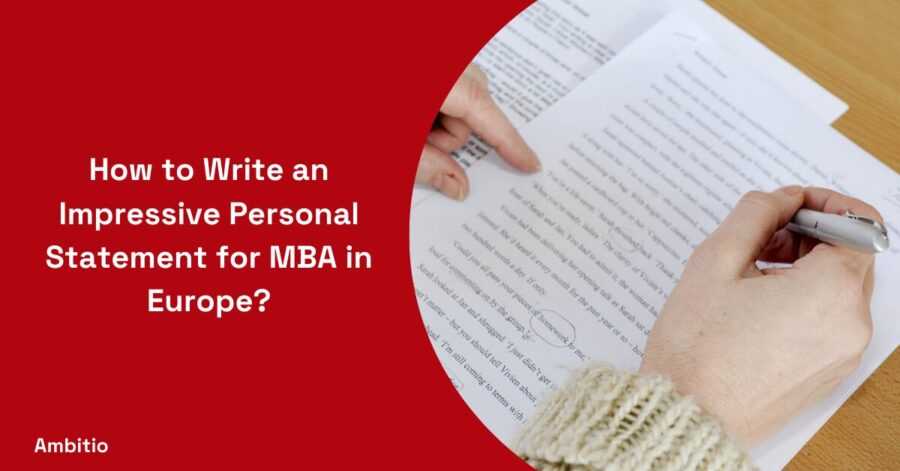9 April 2025
6 minutes read
How to Write an Impressive Personal Statement for MBA in Europe?

Key Takeaways:
- Tailor your personal statement for MBA in Europe to reflect your unique story and career goals, avoiding generic statements that many students might use.
- Thoroughly research the school and program to showcase your understanding and how it aligns with your aspirations, setting the stage for success.
- Make every word count—your personal statement isn’t just to fill space, it’s your chance to stand out and leave a lasting impression on the admission committee.
Writing a standout personal statement for MBA in Europe is crucial, it’s your chance to directly grab the attention of the admissions team. With hundreds of applications flooding in, your MBA personal statement needs to do more than just highlight your work experience and qualifications. It must tell a compelling story of who you are and why you’re the best fit for the MBA program. Many students struggle to tailor their statement of purpose to align with business school expectations, missing the mark in presenting their personal and professional growth.
To truly stand out from the crowd, it’s essential to know the school’s application and showcase how your skills and knowledge fit with the cohort of future leaders. Avoid irrelevant information and mistakes to avoid while writing your MBA application. Instead, focus on the key points that speak to your future aspirations and personal development, setting the stage for success in the competitive world of international business.
Why a Personal Statement Matters for Your MBA Application in Europe?
Your personal statement for MBA in Europe plays a pivotal role in determining your candidacy for top MBA programs. The admission committee uses it to evaluate not only your relevant experience and skills but also how well you understand the course requirements and the particular university you are applying to. Whether you’re aiming for Harvard Business School (HBS MBA) or Wharton, your MBA personal statement is your chance to showcase your passion for business management and your future career goals. It’s where you can demonstrate your transferrable skills and analytical skills that will make an impact in the business world.

While many students might feel intimidated by the application process, understanding the importance in your candidacy is key. Your personal statement is the part of the course application that can make or break your chances. By carefully crafting your story, and avoiding irrelevant information, you’ll present yourself as a future leader who is passionate and driven to succeed. This statement isn’t just a formality; it gives the admissions officer insight into your business goals, academic journey, and career in business. Ultimately, it’s your opportunity to best foot forward, aligning your stories and experiences with the cohort of future leaders at your desired school.
Key Elements of a Strong Personal Statement for MBA in Europe
A strong personal statement for MBA in Europe is your opportunity to showcase who you are, why you’re applying, and how well you fit into the degree program and cohort of future leaders at your chosen business school.

Here are the key elements to include:
- Clear Career Goals: Demonstrate your business goals and how the MBA program aligns with them. Explain why you’re applying for this course and how it will shape your career in business.
- Relevant Skills and Experience: Highlight your relevant skills and work experience, showing how they’ve prepared you for the challenges of the program. Avoid focusing on setbacks unless you can present them as learning experiences.
- Personal Story and Motivation: Your personal statement is a chance to show your passion and drive. Avoid making apologies or dwelling on irrelevant details. Focus on why this particular program is the right fit for you.
- Understanding the School and Program: Make sure to know the school and understand the course in detail. Referencing the program’s unique aspects or its approach to business management will demonstrate your genuine interest.
- Fit with the Cohort and Future Leaders: Address how you will contribute to and learn from your cohort with future leaders. Show that you are invested in being part of a diverse, driven group, ready to collaborate and contribute to cultural change.
By following these tips on writing, you’ll create a personal statement that stands out from the hundreds of applications that MBA admissions consulting teams review, potentially opening doors to schools like Stanford GSB or Fuqua.
How to Make Your Personal Statement Stand Out to European Business Schools
To make your personal statement for MBA in Europe truly stand out, it’s essential to craft a narrative that reflects both your personal and professional qualities. Here’s how to do it:
- Be Authentic and Personal: Many personal statements for postgraduate applicants tend to sound generic. To stand out, write a personal statement that tells your unique story and avoids making any apologies. Your statement should reflect your real motivations, not just what you think the admissions officer wants to hear.
- Understand the School and Program: It’s crucial to know the school and demonstrate a deep understanding of the course. This shows that you’ve invested time into getting to know the program and are not just applying to fill a spot. Referencing specific aspects of the degree program that excite you will undoubtedly pique their interest.
- Highlight Relevant Experience: Discuss your academic background and relevant experience, focusing on how they have prepared you for the challenges of writing an MBA personal statement. Avoid mentioning sensitive topics or irrelevant information that doesn’t add value to your narrative.
- Tailor Your Statement: While personal statement examples can provide inspiration, avoid personal statement examples which many students use as a template. Customize yours to reflect your unique postgraduate aspirations and how the program aligns with your career goals.
- Address Future Aspirations: Show how the personal statement fits into your long-term business goals. This isn’t just a part of the application; it’s an opportunity to set the tone for your future within the cohort of future leaders.
By following these steps, you’ll craft a personal statement that stands out among the hundreds of applications per business school, ensuring your candidacy is noticed.
Common Pitfalls to Avoid in Your Personal Statement for MBA in Europe
When crafting your personal statement for MBA in Europe, it’s easy to fall into common traps. Here are some pitfalls to avoid:
- Generic Statements: Many students use a personal statement which many others might also rely on, leading to a lack of originality. Tailor your statement to your unique experiences and motivations.
- Neglecting the School’s Fit: Don’t overlook the importance of getting to know the school. It’s crucial to demonstrate that you’ve checked the application thoroughly and understand how the program aligns with your goals.
- Overloading with Irrelevant Information: Avoid a personal statement that focuses too much on generic accomplishments. Admissions teams don’t want a statement which many students might submit, they want something that stands out.
- Filling the Space: A personal statement for MBA in Europe isn’t just to fill space in your application. Make every word count to highlight your relevant skills and goals.
10 Top Universities to Study MBA in Europe
Did you know that Europe is home to some of the world’s most prestigious MBA programs, often offering shorter course durations and globally competitive salaries? With diverse cohorts, strong ties to international industries, and thriving financial hubs like London, Paris, and Berlin, Europe is quickly becoming a top destination for MBA aspirants worldwide.
Here’s a quick comparison of the top 10 MBA universities in Europe based on average tuition fees, average post-MBA salary, and entrance exams required:
| University Name | Average Tuition Fees (EUR) | Average Salary Post-MBA (EUR) | Exams Required |
|---|---|---|---|
| INSEAD (France/Singapore) | €89,000 | €105,900 | GMAT / GRE, IELTS/TOEFL |
| London Business School (UK) | €109,000 | €103,000 | GMAT / GRE, IELTS/TOEFL |
| IE Business School (Spain) | €82,000 | €95,000 | GMAT / GRE, IELTS/TOEFL |
| HEC Paris (France) | €88,000 | €100,000 | GMAT / GRE, IELTS/TOEFL |
| SDA Bocconi (Italy) | €65,000 | €90,000 | GMAT / GRE, IELTS/TOEFL |
| ESADE Business School (Spain) | €73,800 | €85,000 | GMAT / GRE, IELTS/TOEFL |
| Judge Business School, Cambridge (UK) | €73,000 | €95,200 | GMAT / GRE, IELTS/TOEFL |
| Oxford University (UK) | €75,000 | €95,000 | GMAT / GRE, IELTS/TOEFL |
| Rotterdam School of Management (Netherlands) | €57,000 | €82,000 | GMAT / GRE, IELTS/TOEFL |
| ESMT Berlin (Germany) | €49,500 | €80,000 | GMAT / GRE, IELTS/TOEFL |
Conclusion
Your personal statement for MBA in Europe is far more than just a requirement—it’s a critical part of your application. Avoid the mistake of submitting a personal statement which many students might use, as it lacks the originality that will hold a lot of importance in the eyes of the admissions team. The goal is not to simply fill space, but to showcase your unique journey, goals, and alignment with the program. Make sure your statement stands out.
If you need guidance on crafting a compelling MBA personal statement, let Ambitio help you get started on the right foot.
FAQs
What is the purpose of a personal statement for an MBA?
A personal statement showcases your motivations, career goals, and suitability for the program, helping admissions committees understand your unique qualities.
What should be included in a personal statement for an MBA in Europe?
Include your introduction, academic and professional background, career goals, reasons for choosing the program, and personal attributes.
How can I tailor my personal statement to European business schools?
Tailor your statement by highlighting specific aspects of the program that align with your goals and interests.
How do I highlight my career goals effectively?
Clearly connect your past experiences with your future goals and explain how the MBA will help achieve them.
Should I include extracurricular activities in my personal statement?
Yes, include extracurricular activities that demonstrate leadership, teamwork, or initiative.
How can I make my personal statement stand out?
Use authentic storytelling and anecdotes to illustrate your points and connect them to your goals.
What are common mistakes to avoid when writing a personal statement?
Avoid generic statements, poor grammar, and failing to customize the statement for each school.

You can study at top universities worldwide!
Get expert tips and tricks to get into top universities with a free expert session.
Book Your Free 30-Minute Session Now! Book a call now




























